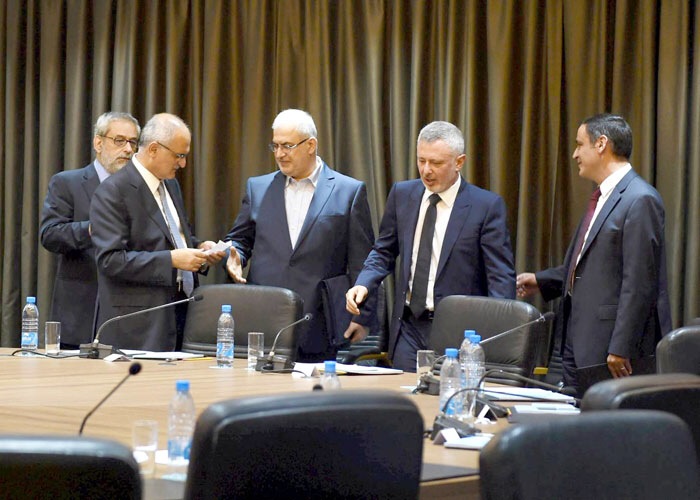Franjieh the second?
Michael Young/Now Lebanon/November 26/15
A deal on the presidency could be closer than we know
The seriousness of Sleiman Franjieh’s candidacy was evident this week as the political class generally avoided discussing the details for fear it would undermine an arrangement. Yet the information seeping out indicated there was a regional and international consensus to fill Lebanon’s presidential vacuum. On the Saudi side, where the obstacles to a Franjieh presidency were expected to be highest, a decision was almost certainly taken to go along with the option. Otherwise, Saad Hariri would not have taken the risky initiative of opening a dialogue with Franjieh at a time of high regional tensions. Absent a Saudi veto, Franjieh’s chances of securing a favorable vote from the Future Movement are high, even if some still claim there are steps that need to be taken before Franjieh is elected.
Another telltale sign of the Saudi shift was the kingdom’s decision to receive Druze leader Walid Jumblatt in October. Jumblatt, who has been active as mediator in the presidential crisis, met there with King Salman, always a sign of favor, as well as Hariri. Something evidently was cooking at the time. Other reports indicate that the Iranians, too, may be on board with Franjieh. According to the usually well-informed Philippe Abi-Akl, the decision to move toward a resolution of the presidential deadlock was transmitted to Hezbollah’s secretary general, Hassan Nasrallah, by Iran’s deputy foreign minister, Hossein Abdellahian, when he recently visited Beirut.
Signs of change in Hezbollah’s position came in Nasrallah’s speech on Martyrs’ Day this month. He declared: “Let’s come together and discuss the main issues and reach a settlement.” Hezbollah parliamentarian Nawaf Moussawi suggested this was a turning point after 18 months of a debilitating void. In a message to Prime Minister Tammam Salam on the occasion of Independence Day, President Barack Obama showed that he too was of a similar mindset. “For the sake of Lebanon’s stability and security, now is the time for Lebanese leaders to act in the national interest and elect a president,” Obama wrote. His was perhaps an effort to ensure that early efforts to resolve the presidential stalemate would not be derailed.
And France was involved, having taken the initiative of raising the Lebanese impasse with the Iranians last summer (even if, at the time, the Iranian response was lukewarm). Lebanon is a constant French concern and the appointment as ambassador in Beirut of Emmanuel Bonne, who served previously with Francois Hollande at the Elysee Palace, was a sign of this. The French were surely in on every stage of the Franjieh scenario.
It remains unclear what kind of package deal may be in the works to bring Franjieh to power, but one can venture a guess. It seems probable that one component would be Hariri’s appointment as prime minister. Not only would this allow him to return to the political center, from which he was excluded in 2011; it would also mean that Hezbollah guarantees his security, at a time when the party needs a credible Sunni partner to calm Sunni-Shiite tensions that have devastated the Middle East.
There is a risk that Hariri could become something similar to his father: a Sunni covering for Shiite hegemony. He would have the latitude to lead a government, but also a limited margin of political maneuver. The post-1990 Syrian-Saudi accord over Lebanon could effectively be replaced by an Iranian-Saudi one, even if Saad Hariri’s leverage is greater.
Michel Aoun has to be compensated for having been Hezbollah’s willing tool to block the system. You have to pity Aoun in some ways, as he’s spent much of his political career being someone else’s dupe, always to end up falling short of his ambitions. Some have suggested the general will be rewarded with an election law that allows the Free Patriotic Movement to retain a significant share of seats in parliament, as well as a lucrative ministry for his son-in-law, Gebran Bassil.
Other Christian parties, above all the Lebanese Forces, see little to applaud in a Franjieh presidency. His election would sound the death knell of what remains of March 14, from which Samir Geagea effectively withdrew when he began his dialogue with Aoun months ago. Franjieh as president and an election law favoring Aoun would primarily be at his expense.
In light of these developments one might reconsider the recent trip of pro-Syrian Sunni politician Abdel Rahim Mrad to Saudi Arabia. This was interpreted as a sign that the kingdom was looking to widen its contacts in the Sunni community as a way of marginalizing Hariri. However, the trip could really have been an effort to facilitate an eventual Hariri comeback by neutralizing a possible rival for the prime minister’s position and seeing to it that all Sunnis were on the same page.
In retrospect, Hezbollah’s obstructionism may have worked. The party could be on the cusp of electing the individual they most wanted as president, despite their vocal support for Aoun. Franjieh is preferable to Aoun because he has fewer means to act independently. Moreover, being much younger, he is a longer-term investment. Above all, he satisfies Syria when Iran remains keen to take the Assad regime’s preferences into account.
The deal may not yet be done. However, the delay in the national dialogue conference until December 14 was probably an effort to set a deadline before Christmas to allow the political parties to endorse Franjieh’s election. Hezbollah may still need some time to persuade Aoun. The headline in Al-Akhbar on Thursday was revealing: “Nasrallah to Aoun: You and me are one, and we will not take a ‘presidential decision’ without you.”
By implying that there was a presidential decision other than Aoun’s election, the pro-Hezbollah paper was making it apparent that something had changed in Hezbollah’s approach.





















